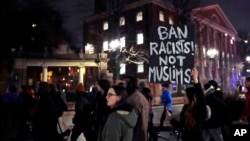U.S. Attorney General Jeff Sessions said Thursday that he would ask the Supreme Court to review an appeals court ruling that blocks President Donald Trump's executive order limiting travel to the U.S. from six predominantly Muslim countries.
Sessions issued a statement saying, "President Trump's executive order is well within his lawful authority to keep the nation safe."
"The Department of Justice strongly disagrees with the decision of the divided court, which blocks the president's efforts to strengthen this country's national security. ... The president is not required to admit people from countries that sponsor or shelter terrorism, until he determines that they can be properly vetted and do not pose a security risk to the United States," the attorney general said.
Sessions was responding to a ruling earlier in the day by the 4th U.S. Circuit Court of Appeals in Richmond, Virginia, in which it declined to reinstate the three-month ban on most travelers from the six nations.
The court said the executive order did amount to a Muslim ban. "Laid bare, this executive order is no more than what the president promised before and after his election: naked invidious discrimination against Muslims," the judges said in their 205-page ruling.
A majority of the panel of 13 judges ruling in the case cited Trump's tweets, television interviews and statements posted on his campaign website as evidence of his intent.
Three judges dissented on the ground that the executive order did not mention religion.
"Far from containing the sort of religious advocacy or disparagement that can violate the Establishment Clause, the order contains no reference to religion whatsoever. Nor is there any trace of discriminatory animus," the dissenting judges wrote.
They also criticized the use of campaign material as evidence: "If a court, dredging through the myriad remarks of a campaign, fails to find material to produce the desired outcome, what stops it from probing deeper to find statements from a previous campaign, or from a previous business conference, or from college?"
In March, a federal judge in Maryland blocked the travel ban, which itself was a revised version of one issued in January that was tweaked after encountering legal roadblocks.
The appeals court majority did not think the second version was an improvement.
"Significantly, in revising the order, the executive branch did not attempt to walk away from its previous discriminatory order. Instead, it simply attempted to effectuate the same discrimination through a slightly different vehicle — the proverbial wolf in sheep's clothing."
The Trump administration was given 90 days to appeal.
One of the plaintiffs in the suit, the International Refugee Assistance Project, vowed to fight "as long as it takes." IRAP's director, Becca Heller, said: "Once again, the courts have confirmed that the Muslim ban is discriminatory and harmful. The president cannot simply slap the words 'national security' on an unconstitutional policy and get away with it."
A part of the executive order stopping refugee arrivals for 120 days was not included in Thursday's ruling. But a second appeals court, the 9th Circuit in San Francisco, is reviewing the travel order on a wider basis, including the ban on refugees.
The original stay in the 9th Circuit case was issued by a judge in Hawaii.
VOA's Victoria Macchi contributed to this report.




